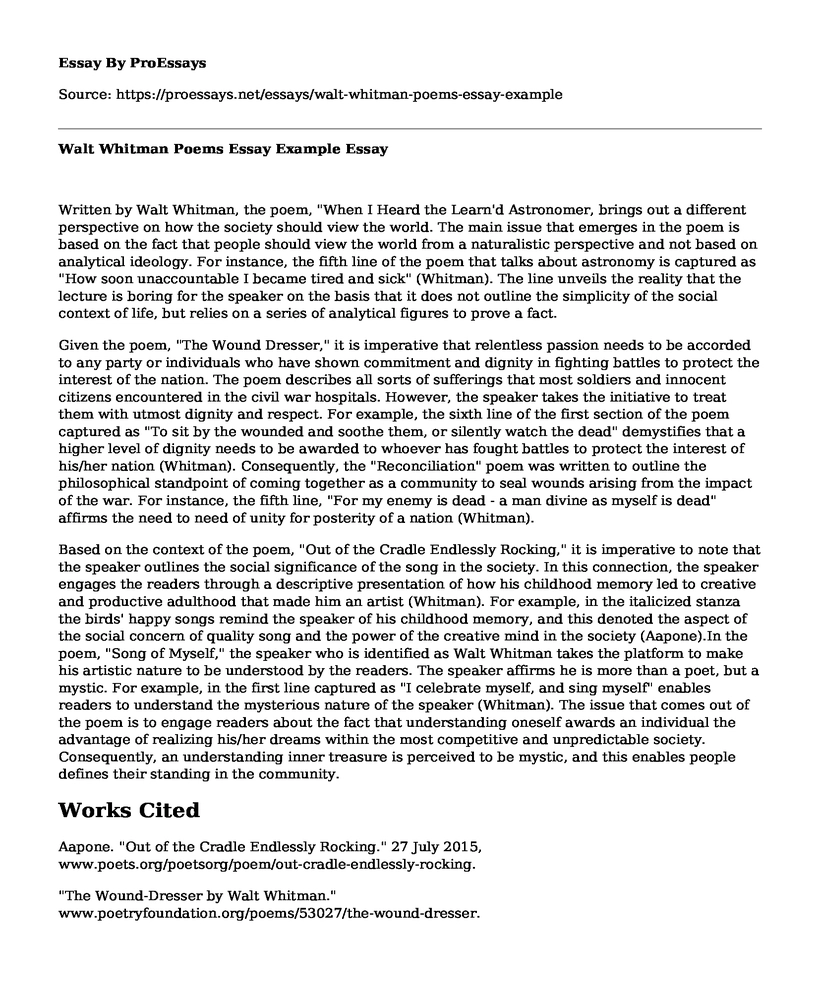Written by Walt Whitman, the poem, "When I Heard the Learn'd Astronomer, brings out a different perspective on how the society should view the world. The main issue that emerges in the poem is based on the fact that people should view the world from a naturalistic perspective and not based on analytical ideology. For instance, the fifth line of the poem that talks about astronomy is captured as "How soon unaccountable I became tired and sick" (Whitman). The line unveils the reality that the lecture is boring for the speaker on the basis that it does not outline the simplicity of the social context of life, but relies on a series of analytical figures to prove a fact.
Given the poem, "The Wound Dresser," it is imperative that relentless passion needs to be accorded to any party or individuals who have shown commitment and dignity in fighting battles to protect the interest of the nation. The poem describes all sorts of sufferings that most soldiers and innocent citizens encountered in the civil war hospitals. However, the speaker takes the initiative to treat them with utmost dignity and respect. For example, the sixth line of the first section of the poem captured as "To sit by the wounded and soothe them, or silently watch the dead" demystifies that a higher level of dignity needs to be awarded to whoever has fought battles to protect the interest of his/her nation (Whitman). Consequently, the "Reconciliation" poem was written to outline the philosophical standpoint of coming together as a community to seal wounds arising from the impact of the war. For instance, the fifth line, "For my enemy is dead - a man divine as myself is dead" affirms the need to need of unity for posterity of a nation (Whitman).
Based on the context of the poem, "Out of the Cradle Endlessly Rocking," it is imperative to note that the speaker outlines the social significance of the song in the society. In this connection, the speaker engages the readers through a descriptive presentation of how his childhood memory led to creative and productive adulthood that made him an artist (Whitman). For example, in the italicized stanza the birds' happy songs remind the speaker of his childhood memory, and this denoted the aspect of the social concern of quality song and the power of the creative mind in the society (Aapone).In the poem, "Song of Myself," the speaker who is identified as Walt Whitman takes the platform to make his artistic nature to be understood by the readers. The speaker affirms he is more than a poet, but a mystic. For example, in the first line captured as "I celebrate myself, and sing myself" enables readers to understand the mysterious nature of the speaker (Whitman). The issue that comes out of the poem is to engage readers about the fact that understanding oneself awards an individual the advantage of realizing his/her dreams within the most competitive and unpredictable society. Consequently, an understanding inner treasure is perceived to be mystic, and this enables people defines their standing in the community.
Works Cited
Aapone. "Out of the Cradle Endlessly Rocking." 27 July 2015, www.poets.org/poetsorg/poem/out-cradle-endlessly-rocking.
"The Wound-Dresser by Walt Whitman." www.poetryfoundation.org/poems/53027/the-wound-dresser.
Whitman, Walt. "Chapter 29 "Song of Myself"." Mandell, Laurie G. Kirszner & Stephen R. LIT Student Edition. Boston: Michael Rosenberg, 2012. 520-521.
Cite this page
Walt Whitman Poems Essay Example. (2022, May 26). Retrieved from https://proessays.net/essays/walt-whitman-poems-essay-example
If you are the original author of this essay and no longer wish to have it published on the ProEssays website, please click below to request its removal:
- Paper Example on Importance of Symbolism in the Modern Day
- Theme Construction in Kurosawa's Dreams
- August Wilson's Play "Fences" Essay
- Hamlet Obituaries Essay
- Essay Example on The Beast of War: Tim O'Brien's The Things They Carried
- Essay Example on Women's Strength: Mary Wollstonecraft's Reflections on Equality
- Past and the Present in the Novel the Kite Runner - Essay Sample







